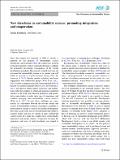| dc.contributor.author | Kauffman, Joanne | |
| dc.contributor.author | Arico, Salvatore | |
| dc.date.accessioned | 2016-09-16T20:24:38Z | |
| dc.date.available | 2016-09-16T20:24:38Z | |
| dc.date.issued | 2014-08 | |
| dc.identifier.issn | 1862-4065 | |
| dc.identifier.issn | 1862-4057 | |
| dc.identifier.uri | http://hdl.handle.net/1721.1/104343 | |
| dc.description.abstract | Since this journal was launched in 2006 to provide a platform for the pioneers of sustainability science (Komiyama and Takeuchi 2006), the science has matured in the development of theory and methodologies to address the potentially devastating consequences of the present development paradigm. The gains in research, however, do not mean that sustainability science in its present state will fulfill its promise of transformational change (Van der Leeuw et al. 2012). Hurdles remain, including insufficient engagement with stakeholder groups (Wiek et al. 2012), lack of robust communication and entrepreneurial skills on the part of scientists generally (Baron 2010; Brownell et al. 2013), the need for better support (structural and intellectual) within the academy to attract and maintain committed scholars to the field, and enhanced qualitative and quantitative meta-studies to make better use of experiences and evidence emerging from sustainability science research (Wiek et al. 2012). In sum, these challenges are symptomatic of a disconnect between the nascent science and society. If sustainability scientists are going to contribute to transformative change to achieve sustainable development, they must accept roles that go beyond traditional reflective scientist modes and that are outside of their professional comfort zones. It is clear that a higher level of knowledge integration and greater (tighter) cooperation between the generators and users of such knowledge are needed to overcome barriers to meeting these challenges. (Frodeman et al. 2010; Wiek et al. 2012; Komiyama 2014). | en_US |
| dc.publisher | Springer Japan | en_US |
| dc.relation.isversionof | http://dx.doi.org/10.1007/s11625-014-0259-3 | en_US |
| dc.rights | Creative Commons Attribution-Noncommercial-Share Alike | en_US |
| dc.rights.uri | http://creativecommons.org/licenses/by-nc-sa/4.0/ | en_US |
| dc.source | Springer Japan | en_US |
| dc.title | New directions in sustainability science: promoting integration and cooperation | en_US |
| dc.type | Article | en_US |
| dc.identifier.citation | Kauffman, Joanne, and Salvatore Arico. “New Directions in Sustainability Science: Promoting Integration and Cooperation.” Sustain Sci 9, no. 4 (August 8, 2014): 413–418. | en_US |
| dc.contributor.department | Massachusetts Institute of Technology | en_US |
| dc.contributor.mitauthor | Kauffman, Joanne | |
| dc.relation.journal | Sustainability Science | en_US |
| dc.eprint.version | Author's final manuscript | en_US |
| dc.type.uri | http://purl.org/eprint/type/JournalArticle | en_US |
| eprint.status | http://purl.org/eprint/status/PeerReviewed | en_US |
| dc.date.updated | 2016-08-18T15:22:06Z | |
| dc.language.rfc3066 | en | |
| dc.rights.holder | Springer Japan | |
| dspace.orderedauthors | Kauffman, Joanne; Arico, Salvatore | en_US |
| dspace.embargo.terms | N | en |
| mit.license | OPEN_ACCESS_POLICY | en_US |
| mit.metadata.status | Complete | |
